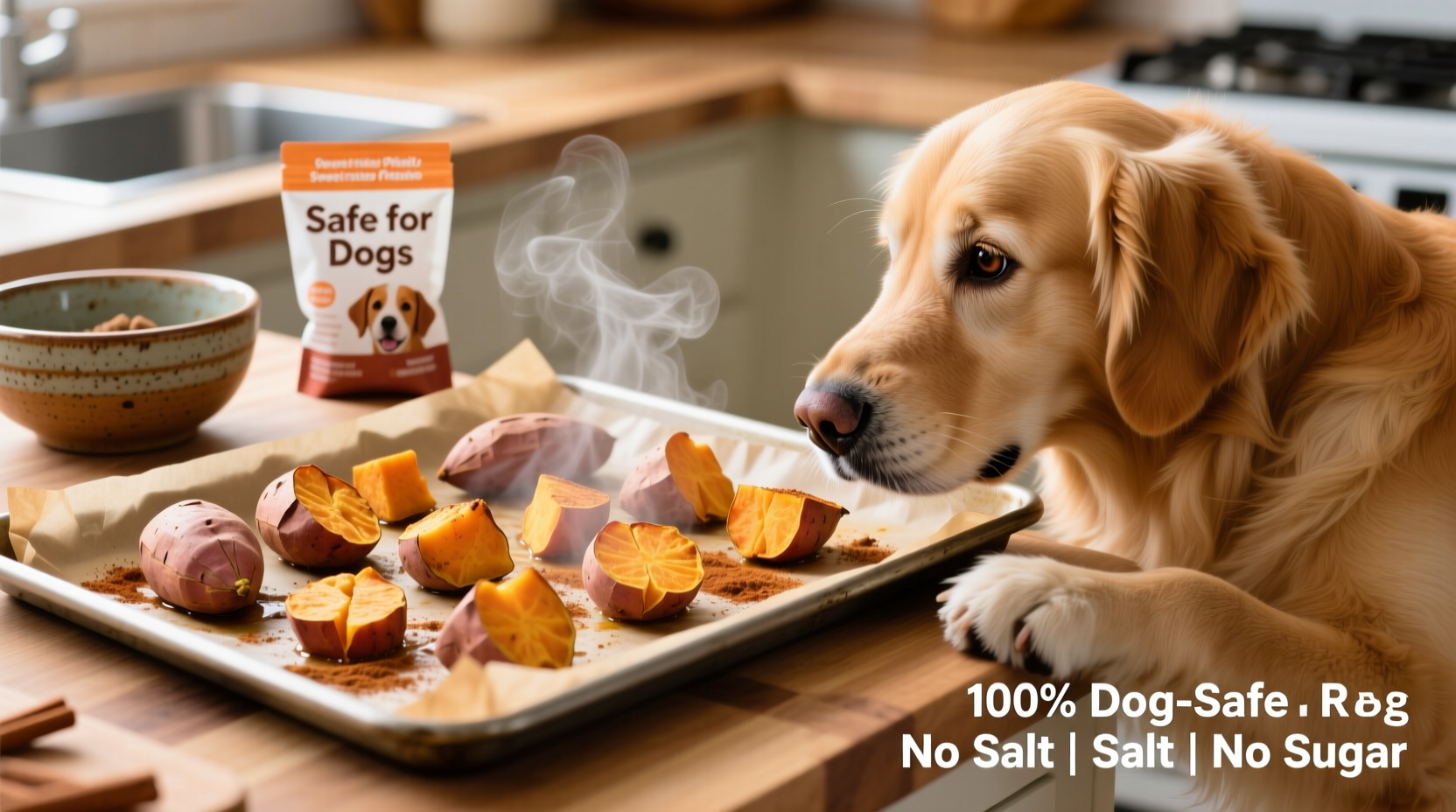Yes, dogs can safely eat cooked sweet potatoes in moderation. Peel, boil or bake without seasonings, and serve cooled in small portions (1-2 tablespoons per 10 lbs of body weight). Never feed raw sweet potatoes or those with added sugar, salt, or spices.
Adding sweet potatoes to your dog's diet provides essential vitamins and fiber, but improper preparation can cause digestive issues or even intestinal blockages. As a veterinarian-approved food supplement, properly cooked sweet potatoes offer beta-carotene, vitamin A, and potassium that support your dog's immune system and digestion. This guide provides step-by-step instructions that align with veterinary nutrition guidelines to ensure you're preparing this healthy treat safely.
Why Sweet Potatoes Benefit Your Dog's Health
Sweet potatoes rank among the top veterinarian-recommended vegetables for dogs due to their impressive nutritional profile. According to the American Kennel Club, these orange tubers contain three times more fiber than white potatoes, making them excellent for digestive health. The high beta-carotene content converts to vitamin A in your dog's system, supporting vision and immune function.
Unlike some human foods that require extreme caution, sweet potatoes present minimal risks when prepared correctly. The Cornell University College of Veterinary Medicine confirms that cooked sweet potatoes are safe for most dogs, though portion control remains essential.
| Nutrient | Per 100g Cooked Sweet Potato | Benefit for Dogs |
|---|---|---|
| Dietary Fiber | 3.0g | Regulates digestion and prevents constipation |
| Vitamin A | 14187 IU | Supports vision and immune function |
| Vitamin B6 | 0.2mg | Aids metabolism and brain development |
| Potassium | 337mg | Maintains proper muscle and nerve function |
Step-by-Step Cooking Instructions for Dogs
Follow these veterinarian-approved steps to prepare sweet potatoes that are both safe and nutritious for your canine companion. Proper cooking eliminates potential hazards while maximizing nutritional benefits.
Preparation Essentials
Gather these items before starting: organic sweet potatoes (to minimize pesticide exposure), vegetable peeler, sharp knife, cooking pot or baking sheet, and storage containers. Always choose firm sweet potatoes without soft spots or mold, which could indicate spoilage harmful to dogs.
Boiling Method (Safest for Sensitive Stomachs)
- Peel sweet potatoes completely - the skin contains fiber that may cause digestive upset
- Cut into 1-inch cubes for even cooking
- Place in pot and cover with cold water (2 inches above potatoes)
- Bring to gentle boil over medium heat
- Simmer for 20-25 minutes until fork-tender
- Drain thoroughly and cool completely before serving
Baking Method (Preserves More Nutrients)
- Preheat oven to 375°F (190°C)
- Peel and cut sweet potatoes into uniform pieces
- Place on parchment-lined baking sheet
- Bake for 30-40 minutes until easily pierced with fork
- Cool completely before serving

When Sweet Potatoes Aren't Suitable for Dogs
Despite their benefits, sweet potatoes aren't appropriate for all dogs in every situation. Understanding these context boundaries prevents potential health issues:
- Diabetic dogs: The high carbohydrate content may affect blood sugar levels - consult your vet first
- Dogs with pancreatitis: High fiber content could exacerbate inflammation
- Small breed puppies: Risk of choking requires extra-small portions or pureeing
- During medication: Sweet potatoes may interact with certain drugs like ACE inhibitors
The ASPCA Animal Poison Control Center emphasizes that while sweet potatoes themselves aren't toxic, improper preparation creates significant risks. Raw sweet potatoes pose choking hazards and contain compounds difficult for dogs to digest, potentially causing intestinal blockage.
Serving Guidelines by Size and Age
Portion control proves critical when introducing sweet potatoes to your dog's diet. Follow these veterinarian-recommended serving sizes based on body weight:
- Small dogs (under 20 lbs): 1-2 tablespoons daily
- Medium dogs (20-50 lbs): 2-4 tablespoons daily
- Large dogs (50+ lbs): ¼ to ½ cup daily
Introduce sweet potatoes gradually over 7-10 days. Start with ¼ of the recommended portion and monitor for digestive changes. The transition timeline matters as sudden dietary changes commonly cause diarrhea or vomiting in dogs.
Common Preparation Mistakes to Avoid
Many well-meaning pet owners accidentally compromise the safety of this healthy treat. Avoid these critical errors:
- Adding seasonings: Never use salt, sugar, butter, or spices like cinnamon which can upset your dog's stomach
- Serving skins: The tough skin creates choking hazards and digestive difficulties
- Feeding raw: Raw sweet potatoes are hard to digest and may cause intestinal blockage
- Overfeeding: Excessive portions lead to diarrhea or vitamin A toxicity over time
- Using canned varieties: Most contain added sugars and preservatives harmful to dogs
Storage and Reheating Instructions
Proper storage maintains both safety and nutritional value:
- Refrigerate cooked sweet potatoes in airtight container for up to 5 days
- Freeze in portion-sized containers for up to 3 months
- Thaw frozen portions in refrigerator overnight - never microwave
- Always serve at room temperature - never hot
- Discard any uneaten portions after 2 hours at room temperature
When reheating, add a small amount of water to prevent drying. The FDA Center for Veterinary Medicine recommends against using microwaves for pet food as they create uneven heating that could burn your dog's mouth.
Frequently Asked Questions
Can puppies eat cooked sweet potatoes?
Yes, but in very small portions (½ teaspoon for small breeds, 1 teaspoon for larger breeds). Introduce gradually starting at 8 weeks old, and always cut into tiny pieces to prevent choking. Consult your veterinarian before adding to a puppy's diet as their nutritional needs differ from adult dogs.
How often can I feed my dog sweet potatoes?
Limit sweet potatoes to 1-2 times weekly as a treat, not a dietary staple. They should comprise no more than 10% of your dog's daily calorie intake. Overfeeding can lead to digestive upset or vitamin A toxicity over time. Always monitor your dog's response and adjust frequency accordingly.
Are sweet potato fries safe for dogs?
No, commercially prepared sweet potato fries typically contain harmful ingredients like salt, sugar, and oils. Even homemade versions fried in oil create excessive fat content that can trigger pancreatitis. Baked sweet potato sticks without seasonings are safer alternatives, but still should be given sparingly.
What if my dog ate raw sweet potato?
Monitor your dog closely for 24-48 hours. Raw sweet potatoes can cause digestive upset or, in rare cases, intestinal blockage. Contact your veterinarian immediately if you notice vomiting, diarrhea, lethargy, or straining to defecate. Small dogs and puppies face higher risks from consuming raw sweet potatoes.
Can sweet potatoes help with dog diarrhea?
Yes, the high fiber content in cooked sweet potatoes can help firm up loose stools. However, use only plain, boiled sweet potatoes in small portions (1-2 tablespoons) during diarrhea episodes. Consult your veterinarian if diarrhea persists beyond 24 hours, as it could indicate a more serious condition requiring medical attention.











 浙公网安备
33010002000092号
浙公网安备
33010002000092号 浙B2-20120091-4
浙B2-20120091-4